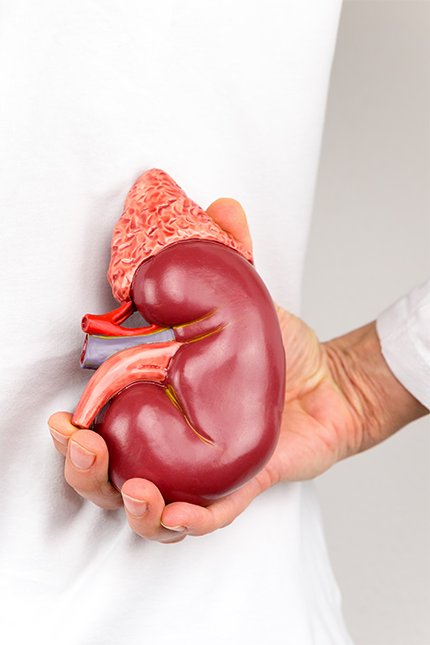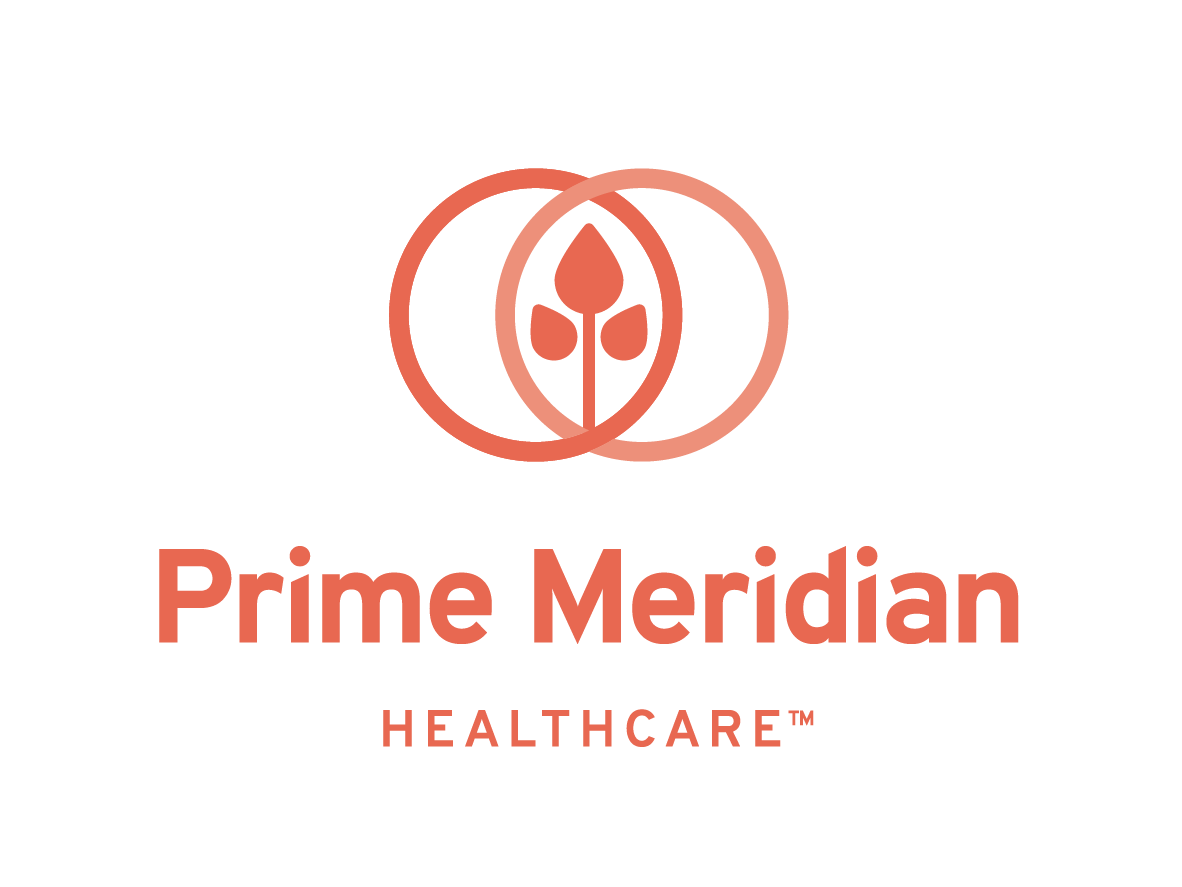The Kidneys
The kidneys are possibly the least known and appreciated of the vital organs. Their ability to filter and excrete toxins is literally a life or death matter, with approximately 50,000 U.S. adults dying each year of chronic kidney disease (CKD) and even more passing from cardiovascular disease that was directly attributed to impaired kidney function (1). While treatment helps to manage kidney disease, incorporating healthy lifestyle changes helps those living with CKD to achieve effective symptom management and feel empowered to live the life they desire. It’s never too early to consult your Prime Meridian Healthcare provider about kidney health, especially if you have CKD risk factors such as metabolic syndrome.
Function
Kidneys are the fist-sized bean-shaped organs located behind your belly and on either side of your spine, and are your renal system’s primary filtering organs. The kidneys effectively eliminate toxic substances and return vital substances such as vitamins, amino acids, and hormones back into the bloodstream. While the primary role of the kidneys is to filter toxins from the blood and package them for elimination through the urine, the kidneys also:
· Regulate extracellular fluid balance.
· Regulate serum mineral levels.
· Secrete hormones that are involved in red blood cell formation, bone health, and blood pressure regulation.
The kidneys, which combined weigh less than 12 ounces, filter approximately 200 liters of fluid and prepare over a liter of urine for excretion every single day. When functioning optimally, an estimated 80% of ingested fluids are filtered and excreted within an hour (2).
Kidney Disease
The most common kidney dysfunction is CKD, the gradual decline of kidney function that affects approximately 15% of U.S. adults (3). Of most concern is that the majority of adults who have CKD (estimated to be as high as 90%) and more than half with severe CKD and not on dialysis are completely unaware of their condition. According to the U.S. Global Burden of Disease study, CKD is significantly associated with increased risk for cardiovascular events and all-cause mortality, and the prevalence among the U.S. population is increasing at a faster pace than other noncommunicable diseases (4). In its earliest stages, CKD does not often present symptoms, but as it progresses, one may experience:
· Urine abnormalities; blood or foaminess, significant increases or decreases.
· Fatigue, along with issues concentrating and sleeping.
· Swelling in the feet, ankles, and/or hands (edema).
· Muscular cramps.
· Unexplained weight loss and disrupted appetite.
CKD is not the only serious kidney-related health condition. Many of the same risk factors for developing CKD are associated with kidney stones and glomerulonephritis (inflammation in the filtering units of the kidneys), and in turn, those conditions increase risk for developing CKD (5). Polycystic kidney disease is another life-threatening kidney condition, but is primarily genetic (6).
KEEPING THE KIDNEYS HEALTHY
The kidneys are no different from other vital organs; the most controllable ways to promote their proper function and to live well with CKD is to practice healthy lifestyle behaviors.
Exercise
Recent evidence suggests that exercise can delay kidney function decline through several different mechanisms (10). Increasing exercise in those with non-dialysis CKD can significantly improve eGFR and blood pressure (11). Other studies have found that increasing exercise also improves overall vascular function and reduces sympathetic nervous system activity, promoting better overall kidney health (12).

Diet
A review of current research suggested that healthy dietary patterns significantly decreased risk of CKD (8). Another review found that those who adhere to a Dietary Approaches to Stop Hypertension (DASH) or Mediterranean diet have lower rates of CKD and that intake of specific dietary components (such as fiber and sodium) are good predictors of overall kidney health (9).
Limit Medication Use
Excessive use of many over-the-counter medications (especially NSAIDs like Aspirin and Ibuprofen) can promote kidney damage over time and even progress existing CKD (15). Many medications are eliminated via the kidneys and those with CKD often suffer from several related comorbidities, so it is paramount to limit the use of non-essential medications and coordinate a safe and effective medication protocol with a medical professional.
Weight Management
Research has shown that obesity is one of the strongest risk factors for the development of CKD, nephrolithiasis (development of kidney stones), and kidney cancer (13). Fortunately, there is evidence that losing weight may be able to reduce proteinuria (excess protein in the urine, an indicator of kidney damage) and prevent the progression of kidney disease (14).
Water Consumption
Recent research suggests that water is a potential therapeutic agent for those living with nephrolithiasis, chronic kidney disease (CKD), and polycystic kidney disease (PKD), helping to preserve renal function and delay cyst growth in PKD patients (7). Generally, water helps the kidneys remove waste from your blood and allows blood to travel freely to the kidneys, delivering essential nutrients.
Healthy functioning kidneys are vital for excreting toxins and regulating fluid concentrations, as well as various other functions. CKD affects more than 1 in 7 U.S. adults, and in most cases does not present symptoms until the condition is quite severe. Promoting healthy functioning kidneys starts with the foundational concepts of Prime Meridian Healthcare’s overall ideology—eat a healthy diet, drink plenty of water, exercise, manage weight, and limit use of non-essential medications. If you have comorbidities or are otherwise concerned about your kidney health, schedule an appointment with your Prime Meridian Healthcare provider.
References
1
Burden of Chronic Kidney Disease
GBD Chronic Kidney Disease Collaboration
4
GFR in Caucasians
Wetzels J., et al.
7
Medicinal Use of Water in Renal Disease
Wang CJ, Grantham JJ, Wetmore JB.
10
Exercise on Kidney and Physical Function
Nakamura K., et al.
13
Obesity and Kidney Disease
Kovesdy C., et al.
2
The Kidneys – A Basic Guide
Kidney Research UK
5
Risk of Chronic Kidney Disease in Patients with Kidney Stones
Chuang T., et al.
8
Diet and Kidney Function
Westing A., et al.
11
Exercise Therapy Improves eGFR
Zhang L.
14
Weight Loss Interventions in CKD
Navaneethan S., et al.
3
Chronic Kidney Disease in USA
Centers for Disease Control
6
Polycystic Kidney Disease Research
Antignac C., et al.
9
Dietary Patterns and Renal Health
Ajjarapu A., et al.
12
Exercise and Lifestyle on Cardiovascular Function in CKD
Howden E., et al.
15
Medication Safety Principles and Practice in CKD
Whittaker C., et al.


